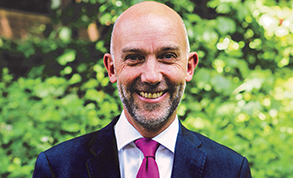Health board audit shows mixed picture
 Mr Crompton (pictured) said three of the seven boards – Betsi Cadwaladr, Swansea Bay and Hywel Dda university health boards – failed to meet their financial duty to break-even over three years. However, Cardiff and Vale University Health Board, which had been in breach of the duty in previous three-year periods, met the target of breaking even between 2019/20 and 2021/22.
Mr Crompton (pictured) said three of the seven boards – Betsi Cadwaladr, Swansea Bay and Hywel Dda university health boards – failed to meet their financial duty to break-even over three years. However, Cardiff and Vale University Health Board, which had been in breach of the duty in previous three-year periods, met the target of breaking even between 2019/20 and 2021/22.
Last week, the auditor announced that Betsi Cadwaladr has been in balance in 2020/21 and 2021/22, aided by significant funding support from the Welsh government. However, he qualified his regularity opinion on the health board’s accounts for 2021/22. This was due to the failure to meet the break-even duty, and – together with other NHS bodies in Wales – because it incurred irregular expenditure in 2021/22 by complying with a ministerial direction to fund clinicians’ pension tax liabilities.
He also issued a qualified ‘true and fair’ opinion because he could not obtain sufficient evidence that certain figures were accurately stated and accounted for in the correct accounting period.
The figures come from a new financial data tool published by Audit Wales, which covers areas such as revenue funding, surpluses and deficits, planned and actual savings, capital expenditure, and spending on agency staff.
The auditors said the NHS in Wales had received an unprecedented increase in funding in 2020/21 (a 14.3% real terms increase) to help the service cope with the Covid pandemic. This was followed by a rise of £0.2bn in 2021/22 (2% in real terms).
But despite significant demand pressure due to Covid and backlog waiting lists, the in-year deficit across NHS Wales remained static at £47.4m compared with £47.9m in 2020/21. And the three-year cumulative overspend fell from £233m to £184m in 2021/22.
Today’s figures show that, overall, health boards delivered 121% of planned savings (nearly £115m) in 2021/22. However, a greater proportion of one-off savings were delivered than in recent years – 49% in 2021/22 compared with 32% in 2020/21.
Covid spending was lower than in 2020/21 – £0.88bn compared with £1.1bn in the previous year. In 2021/22, areas of spending included £0.27bn on vaccination, tracing and testing; £0.06bn on personal protective equipment; and £0.05bn on field hospital and surge capacity. Staff pay was £0.4bn, of which £0.03bn was on agency staff. The auditor said this was only a small proportion of total agency spending, which climbed by 23% compared with the previous year to £0.27bn, principally to cover vacancies.
Mr Crompton said the service received high funding levels in the context of the ongoing pandemic and unprecedented service pressures.
‘NHS bodies have faced the challenge of using that money to both respond to immediate service pressures and to also start to recover and reshape services to tackle backlogs and new patterns of demand,’ he said.
‘The focus on recovery and remodelling must continue into the current year and beyond but our data points to challenges with the workforce as evidenced by a growing expenditure on agency staffing, and a need to develop a more strategic approach to service transformation.
‘As the peak of additional Covid funding subsides, NHS bodies will need to use the reinstated medium-term planning process to set out a financially sustainable path to service recovery and modernisation.’
Related content
The value masterclass shares examples of organisations and systems that have pursued a value-driven approach and the results they have achieved.
This webinar series offers colleagues of ICS organisations the opportunity to discuss common priorities, challenges, and successes within their field.